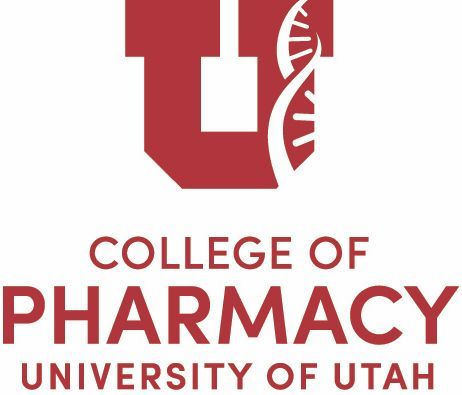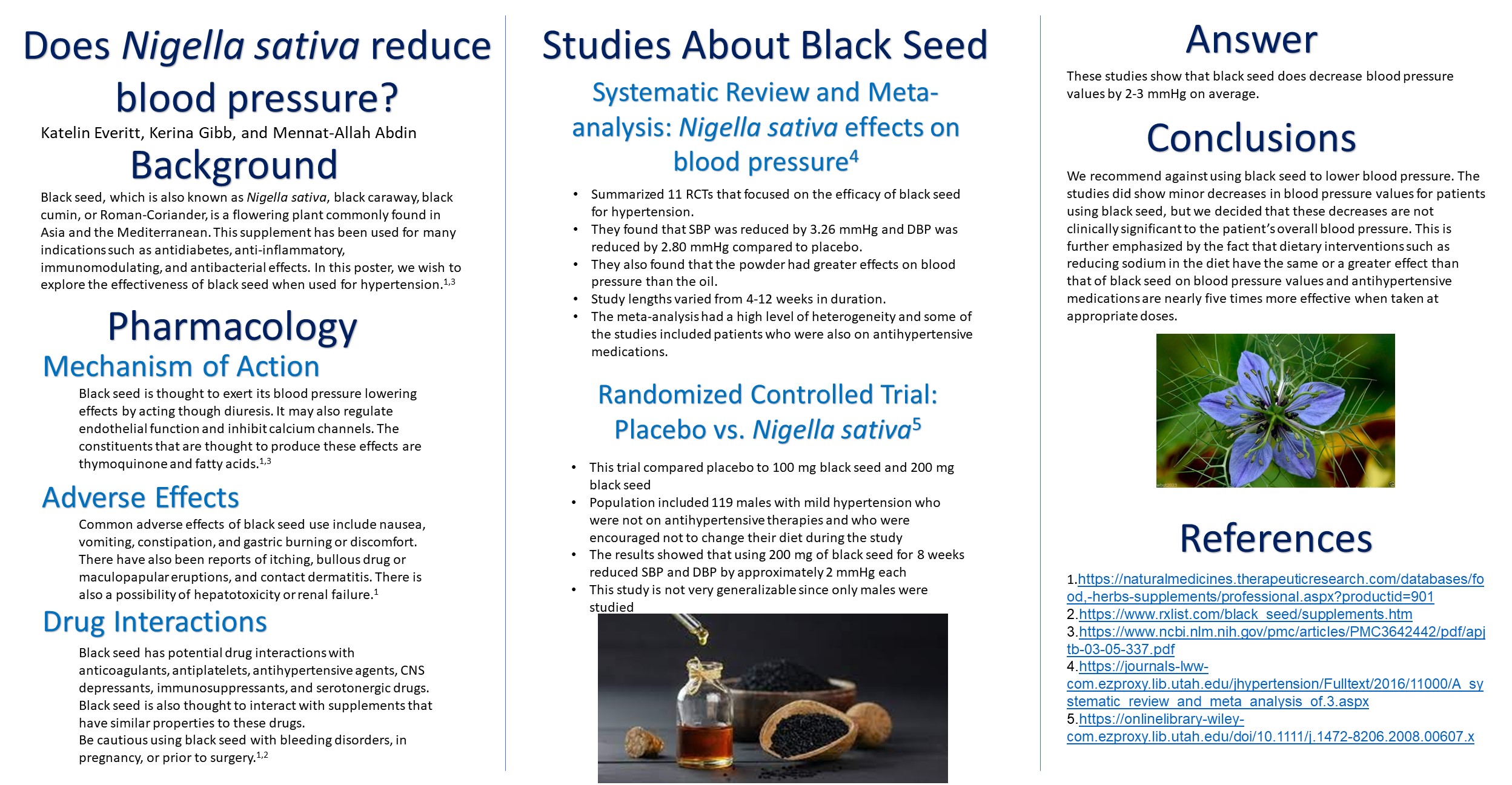Does Black Seed Reduce Blood Pressure?
Mennat-Allah Abdin, Katelin Everitt, Kerina Gibb
Black seed is a flowering plant from southwest Asia and the Mediterannean where it is used commonly for diabetes, hypertension, asthma, COPD, inflammation, bacterial infections, and many more indications.1,2,3 In this project, we hope to determine the safety and efficacy of using black seed for hypertension. There are many proposed mechanisms for black seed with all of them claiming different parts of the plant and different chemicals as the active ingredient. The mechanism for its antihypertensive effects is not known. However, there is substantial evidence to indicate that it could work through a diuretic-like mechanism.1 Other proposed mechanisms for the antihypertensive effects include regulation of endothelial function and inhibition of calcium channels.1
A few studies and case reports have documented the potential risks of using black seed. The most common side effects reported with black seed are nausea, vomiting, constipation, gastric burning, contact dermatitis, and maculopapular eruptions.1 Renal dysfunction has also been seen when using black seed.1 Animal studies have shown that using black seed can lead to hepatotoxicity, although this has not been seen in humans.1 Black seed has potential interactions with anticoagulants, antiplatelets, antihypertensives, antidiabetics, CNS depressants, serotonergic drugs, and immunosuppressants.1 It should be avoided in patients with bleeding disorders, perioperatively, and in pregnancy due to its anticoagulant effects.1
We examined two studies to help determine the efficacy of black seed for hypertension. The first study was a systematic review and meta analysis of 11 randomized controlled trials studying black seed’s utility in hypertension. The studies’ durations varied from 4-12 weeks.4 After compiling the results from the 11 studies, they found that black seed lowers the SBP by 3.26 mmHg and the DBP by 2.80 mmHg when compared to placebo.4 They also found that the powder had greater effects on blood pressure than the oil.4 The study suffered from a high amount of heterogeneity among the different randomized controlled trials they included.
The second study was a randomized controlled trial comparing placebo to 100 mg and 200 mg of black seed.5 The study only included male patients with mild hypertension who were naive to therapy with antihypertensives, so it suffered from a lack of generalizability.5 After 8 weeks, they found that black seed lowers the SBP and the DBP by about 2 mmHg.5
Overall, we concluded that the evidence does show that black seed can lower blood pressure by about 2-3 mmHg, but the effect is so low that it has no real clinical significance.4,5 We would not recommend black seed to a patient for hypertension because of the lack of clinically significant efficacy and its side effects in addition to the risks poorly treated hypertension.
References:
- https://naturalmedicines.therapeuticresearch.com/databases/food,-herbs-supplements/professional.aspx?productid=901
- https://www.rxlist.com/black_seed/supplements.htm
- https://www.ncbi.nlm.nih.gov/pmc/articles/PMC3642442/pdf/apjtb-03-05-337.pdf
- https://journals-lww-com.ezproxy.lib.utah.edu/jhypertension/Fulltext/2016/11000/A_systematic_review_and_meta_analysis_of.3.aspx
- https://onlinelibrary-wiley-com.ezproxy.lib.utah.edu/doi/10.1111/j.1472-8206.2008.00607.x




Responses
Hello Katelin, Mennah, and Kerina – what are the two main things you learned from preparing and developing this topic?
First, although black seed can decrease blood pressure, it is not statistically significant to be used for lowering blood pressure. Second, from reading over the different articles, it has been found that it is used for many other uses but needs to be aware of drug interactions while recommending it.
I thought it was so interesting how hard it was to find solid evidence and then how inconclusive that evidence was. I was thinking that this supplement must reduce people’s blood pressure by at least 5 mmHg if they are using it but the studies showed much lower reductions. I was also amazed that there was not a lot of information on the mechanism of action. The information provided was pretty lackluster compared to what we usually get in therapeutics even though there are plenty of people who use this supplement.
The first thing I learned was how difficult it can be to find good quality studies. There were not a lot of studies to choose from and most of them had poor reporting and were full of confounders. I also learned that even if something has statistically significant results, it does not mean it will be helpful in clinical practice.
Interesting poster! In the first study were there any normotensive subjects included? What were statistical analysis results in that first study? In the second study what was considered mild hypertension? Would you recommend use of this product?
1. The first study was a SRMA which included some studies that were testing black seed in both hypertensive and normotensive patients. I believe that this increased the heterogeneity because only some studies included normotensive patients as well. It’s also difficult to tell if black seed would have different effects in hypertensive vs normotensive patients because they included both in the study.
2. In the first study, the statistical analysis found a difference in SBP (WMD: −3.26 mmHg, 95% CI: −5.10, −1.42) and DBP (WMD: −2.80 mmHg, 95% CI: −4.28, −1.32).
3. In the second study, they defined mild hypertension as SBP between 140 and 159 mmHg and/or DBP between 90 and 99 mmHg.
4. I would not recommend use of this product for hypertension. The benefit of decreasing your blood pressure by 2-3 mmHg does not seem worth the risk of side effects and drug interactions.
I love your poster and it is a very interesting topic. It seems that the nigella sativa has many drug interactions. What if patients have multiple medical conditions such as HTN, diabetes, and/or taking anticoagulant medication? Is it still safe to take nigella sativa?
Thanks.
I would say no! usually, he needs to consult a doctor but I would not recommend it.
I’d agree with your conclusions, it doesn’t sound very helpful to me! Maybe for someone with a slightly elevated BP that isn’t on any medications!
Could nigella sativa potentially be used in addition to a hypertension medication for synergistic effects if a patient had slightly elevated blood pressure, but not high enough to warrant a second medication?
It is theorized that there is additive effects with antihypertensive medications but none of our studies specifically addressed how large or effective that may be. It also didn’t address whether the combination could be dangerous. Overall, this wouldn’t be my first choice even if their blood pressure was only slightly elevated due to the ADEs and DDIs.
Comments are closed.